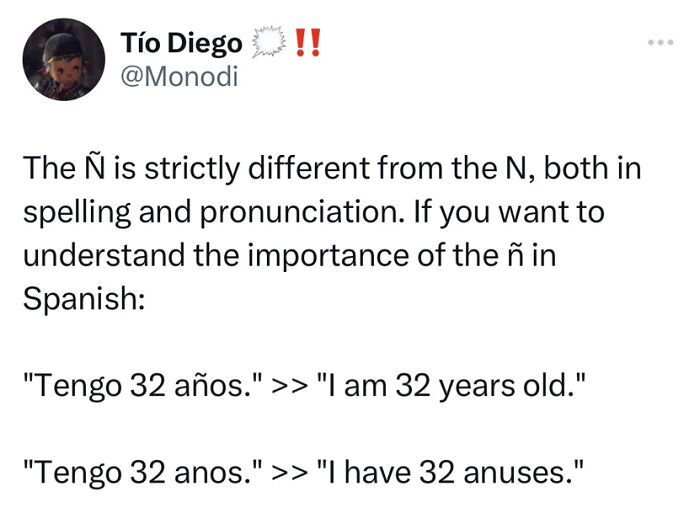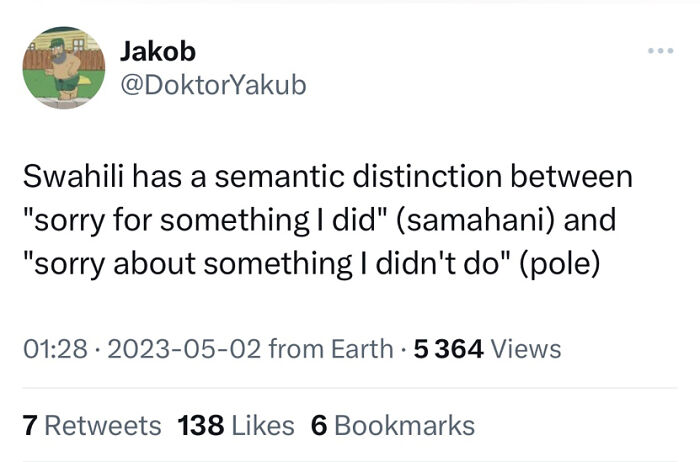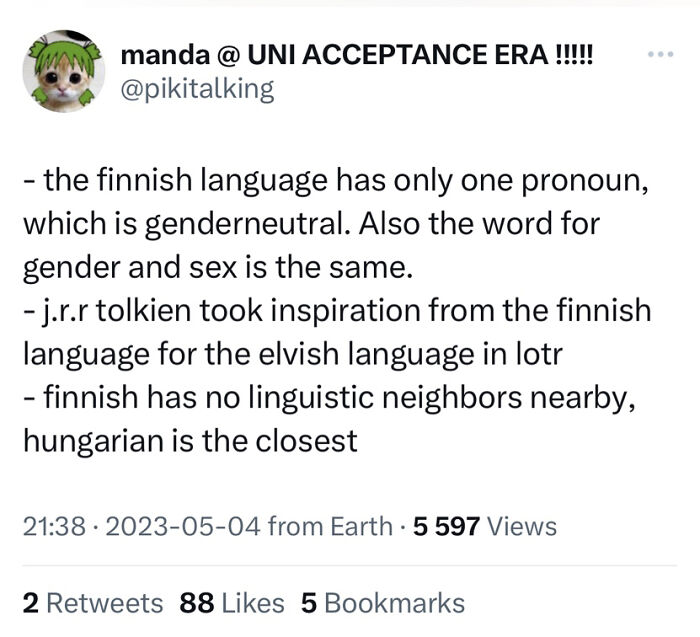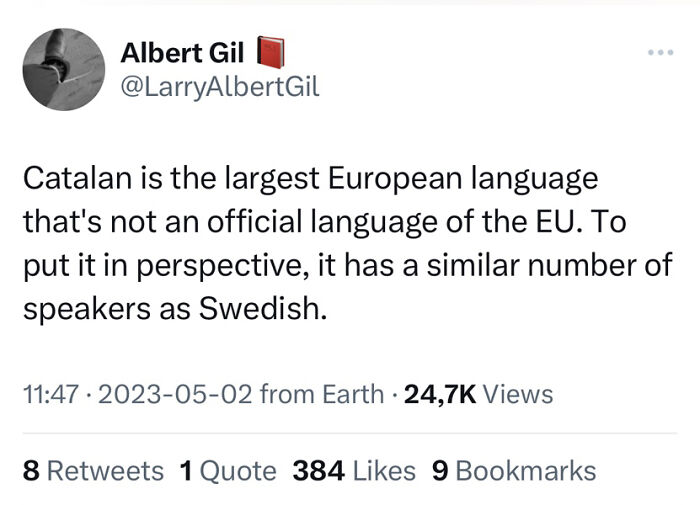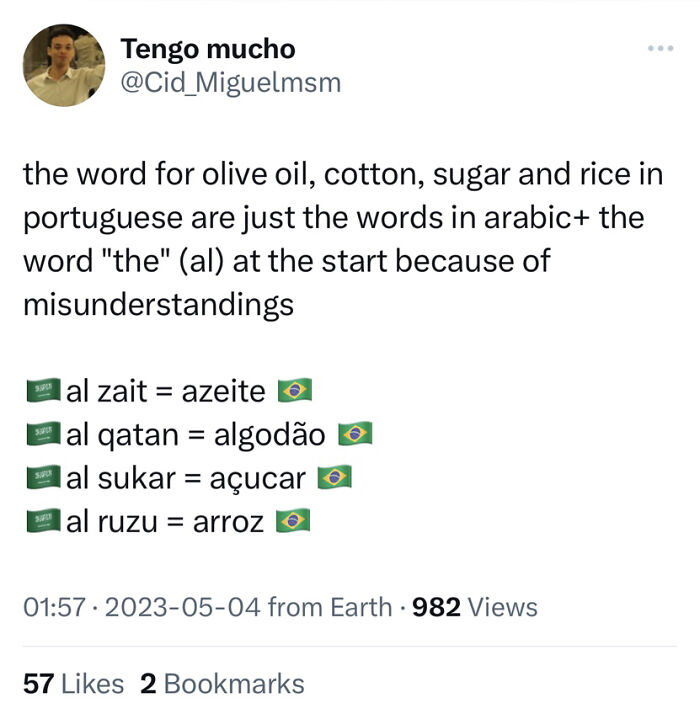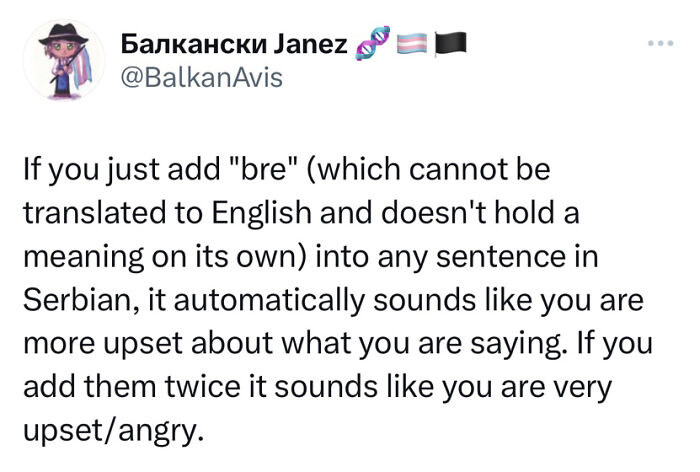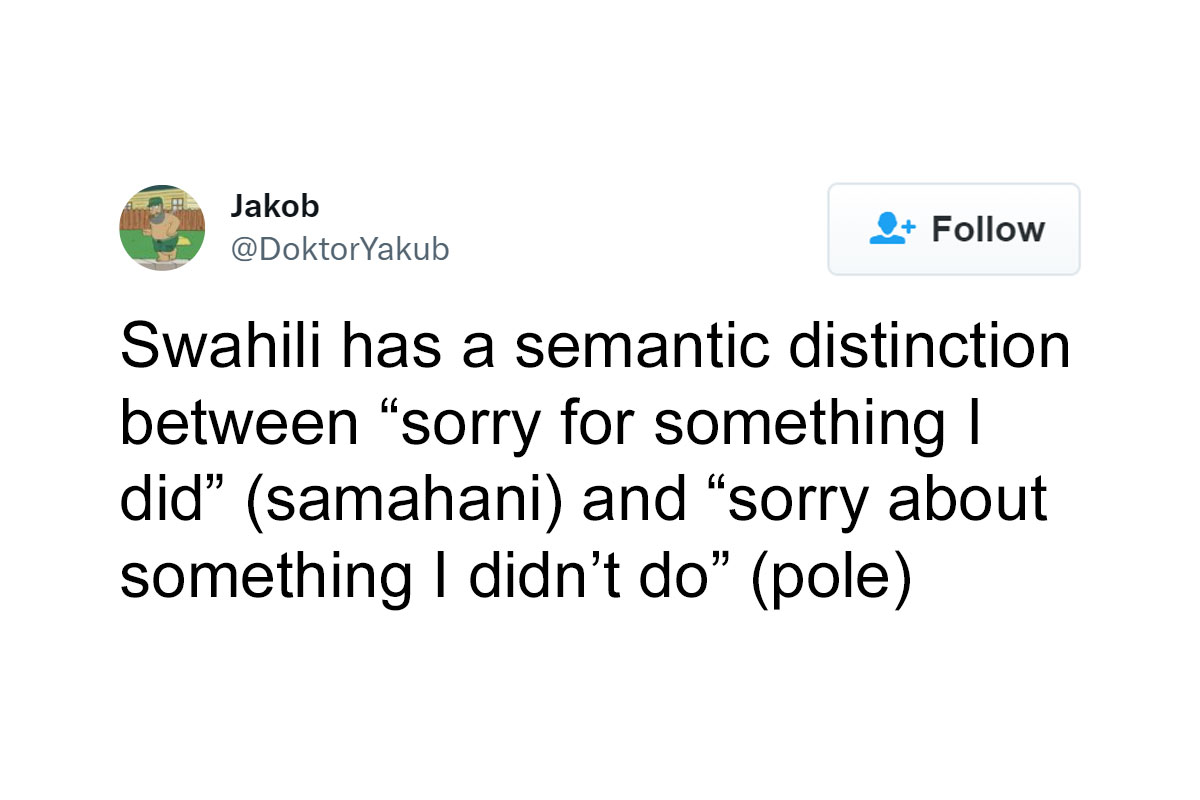
103Kviews
“It Will Irritate You Very Slightly For The Rest Of Your Life”: 30 Cool Language Facts
Learning a new language might be a massive challenge, but it’s an enjoyable one at that. It’s a wonderful workout for your brain. You end up making a ton of new friends. And you end up expanding your perspective by learning loads about new cultures. Many languages have a lot of subtle similarities, differences, and nuances that beginners aren’t (yet) aware of.
Luckily, the internet’s full of linguists—professional and amateur alike—who are happy to lift the veil and give a peek into the inner workings. Twitter user Liam, @LegoRacers2, started an interesting discussion after asking people to share interesting facts about the languages they speak. And, wow, did they deliver. Check out the coolest linguistic facts below! It might be the inspiration you need to start learning something new.

Image credits: LegoRacers2
This post may include affiliate links.
Similar to single and double n in Italian. If you don't pronounce it correctly, the aria 'una Donna a quindici anni' takes on a very different tone.
Bored Panda got in touch with Lisa McLendon, the William Allen White Professor of Journalism and Mass Communications and the Bremner Editing Center Coordinator at the University of Kansas. She speaks Russian and has also studied Czech, Bulgarian, Serbian, and Old Church Slavonic, plus the history of Slavic languages, as part of her Ph.D. coursework at the University of Texas in Austin. McLendon told us about what makes Slavic languages distinct from others in Europe, and what challenges they post to new students.
She explained to us that Slavic languages are a different language family. "Most people, when they think of European languages, think of Romance languages (French, Spanish, Italian, etc.) or Germanic languages (German, Dutch, and Scandinavian languages). But there are other language families in Europe, such as Baltic and Slavic, and a few languages that don’t really fit in at all—Basque and Hungarian, for example," she said.
Are there actual rules for this? Or is it just the instinctive way we speak the language?
"Then there’s the alphabet: Some Slavic languages, such as Russian, Ukrainian, and Bulgarian, use the Cyrillic alphabet, while others, such as Polish, Czech, and Croatian, use the Latin alphabet, with a few extra letters/diacritics to represent sounds that aren’t in, or aren’t represented by one single letter in, the Latin alphabet. And in terms of grammar, most grammatical features in Slavic aren’t completely foreign to Europe, though, as one example, the way the verb systems split tense and aspect is a bit different from the other European language families."
Bored Panda was curious about what challenges someone with a Slavic background might run into when learning English, as well as what would cause trouble for English speakers learning Slavic languages.
"Slavic doesn’t have articles (a, an, the) and that’s always a tricky part of English for learners whose native language lacks articles," Professor McLendon shared
"Verbs are trouble going both ways: English blends tense and aspect and uses a complicated system of auxiliary verbs. But Russian, for example, cleanly separates aspect from tense and then adds an extra layer of complexity with verbs of motion (going, coming, bringing, riding, etc.)."
The professor continued: "Pronunciation in Slavic languages tends to be much closer to spelled-like-it-sounds than in English (isn’t everything?), but Slavic languages have some sounds, such as certain palatalized consonants and the Czech ř, that are hard for native English speakers to master. Going the other way, Slavic languages lack both voiced and voiceless th (as in thin and thine), so those sounds are a bit harder to master for English learners."
The Russian language treats light blue and dark blue as seperate colours.
Twitter user @LegoRacers2’s thread was a massive success. His post was viewed a jaw-dropping 9 million times. However, the real victory was proving that social media can be brimming with people who are happy to share their wisdom. All it takes is the right question to draw them out.
Liam, the author of the viral thread, has been a Twitter user since early 2013, and jokingly describes himself as a ‘Florida Swamp Ape.’
The reasons why people learn new languages can be as numerous as their motivations. For instance, yours truly loves French because it simply sounds awesome. But the reasons tend to fall into a few broad categories. For instance, someone might start delving into the basics of a new language because they’re moving abroad for work or an exchange program. Or they might have some new people from abroad in their social circle who they’d like to connect with on a deeper level.
A Tagalog language joke.
- Bababa ba? (Is the elevator heading downwards?)
- Bababa. (Yes, it is.)
This implies that people don't already know this, and that they don't know the reason. I was taught this when I was around 8 or 9. The old Roman calendar started in March, therefor making September the seventh month. When the start of the year was switched to January, it bumped September along to 9th place.
Others might choose to learn a new language because they’re bored out of their minds, crave a new hobby, or want to dust off some of the cobwebs growing in their brains. Learning anything new is challenging at first, but once you get to grips with the basics, it can be incredibly rewarding. Especially if there are some larger factors at play. Like preparing for a fun trip to Japan. Or wanting to travel across South America without an interpreter. You can forge a lot of friendships if you show the locals that you respect them enough to at least try to speak to them in their tongue.
Meanwhile, some people might decide that they want to reconnect with their cultural heritage. Say, if their relatives migrated from elsewhere decades or even centuries ago. On the other hand, some folks take up their studies not primarily out of the desire to talk to others but to understand their literature and media. There’s a lot that can be lost in translation, after all.
Same with Icelandic - I think. (I'm not a native speaker of Icelandic.) This is what I remember reading in a guide book. The language is so old that they don't have words for modern inventions such as "atomic bomb", for instance. Looking for a name for it, Icelandic linguists dug through old scriptures and came up with a word that translates into "flaming spear falling to the earth" - or something like that.
English, while a wonderful language that is incredibly useful to know, won’t open every door for you. And you cannot expect everyone to speak it. The more languages you’re well-versed in, the more opportunities you’ll be able to take advantage of in life. Having that kind of flexibility is incredibly useful in one’s social life, on the internet, professionally, and at school. Being a human being is all about connecting with others because we’re social creatures. So it makes sense to develop as many social tools as possible to do so.
Hahaha. I'll give it a go: it is a word to decline having not done/said something and also shut up about it now, end of discussion. "But you didn't Tell me we leave at 7!" "Doch!"
It was created in the 15th century and to this day in Korea (both!) there's a commemorative day to celebrate the proclamation of the new alphabet.
Sign language is many centuries old as well. The earliest concrete reference to sign language in Britain is from the wedding of a deaf man named Thomas Tillseye in 1575.
It’s important that you’re passionate about the language and culture. Otherwise, if you feel like someone’s forcing you to learn against your will, you might run out of motivation. However, some individuals pick these languages based mainly on how widespread they are, and how impactful they’re likely to be in the future.
Spanish too. That's what the Arab conquest of the Iberian peninsula did
For fúck's sake BP, ANÙS is a medical term. STOP THIS STUPID CENSORISM!
For instance, Babbel points out that there are 1.3 billion Chinese native speakers on Earth. Meanwhile, around 485 million people speak Spanish as their first language. That’s far more than the (still impressive) 373 million native English speakers there are worldwide. The fourth most spoken language is Arabic (362 million native speakers), and in fifth place is Hindi (344 million speakers).
Going to go going still makes more sense than going to GET going to me. :p
Kind of the same for southern Germany and Austria, "servus" (used for both "hello" and "goodbye") derived from the Latin word for "slave"
We have regional variants on counting in English dialects. Where I come from, they were mainly used for counting sheep, and it goes Yan, Tahn, Teddera (1,2,3). There are a huge number of variants, and it changed almost from valley to valley. See https://en.wikipedia.org/wiki/Yan_tan_tethera
However, Berlitz notes that the total number of English speakers, including native ones, is over 1.4 billion, making it the most popular language worldwide. In the meantime, there are over 602 million people who speak Hindi and 548 million who speak Spanish, whether as their native tongue or a second language.
Adding "you utter" before any common noun does turn any word in an insult.
Actually, the 'est' part of that is the present tense form of the verb to be, so it should be translated as 'is'. The past tense form is 'erat'. Edit, imperfect past tense.
Learning a new language, like developing a new habit or skill, can be incredibly time and energy intensive. What matters the most, above everything else, is consistency. If you have the patience to focus on your studies every single day, you’ll see far more progress than if you do it only when you feel like it. Language learning apps like Duolingo reward their users for staying consistent.
If a native speaker says it’s a slight anything, be sure it’s nigh impossible for non-natives to perfect.
他(he) 她(she) 它(it) are pronounced exactly the same, 'ta'. It's quite funny because the 'it' form isn't well taught to foreign speakers, so you end up with people writing: I bought a table. He was hard and beautiful.
Note: this post originally had 69 images. It’s been shortened to the top 30 images based on user votes.
The more immersed you are in the language and culture, the better your results will be. It really helps if you have the courage to talk to native speakers even if your skills are still underdeveloped. In the meantime, try to consume as much media and literature in the language as you can. Your growth should skyrocket! Though remember to take proper breaks: your mind needs rest for all of that new knowledge to settle down.
In Italy during the fascist regime the use of foreign words was banned, so the government had to come up with alternative words. For example, "cocktail" became "bevanda arlecchina" (arlequin drink), "sandwich" became "tramezzino", "garage" rimessa, "gangster" malfattore, and so on. Even names of people and cities were "italianized": Buenos Aires became "Buonaria", Churchill was written as "Ciorcil" and my favorite: Louis Armstrong became "Luigi Braccioforte" (the literal translation of his surname). Another example of how stupid regimes can be.
Ciorcil and Louis Braccioforte gave me a good laugh, thank you!
Load More Replies...In Finnish there is multiple words inspired by Swedish words. My most favorite one is our word for "jealous". In Sweden it is called "svartsjuka", witch translates roughly into "feeling of black sickness inside" But because our ancestors thought the word "sjuka" - "sick" sounded like the Finnish word "sukka" - "sock" . So our term for jealousy is "mustasukkainen", wich translates to "having black socks on" :D
In Italy during the fascist regime the use of foreign words was banned, so the government had to come up with alternative words. For example, "cocktail" became "bevanda arlecchina" (arlequin drink), "sandwich" became "tramezzino", "garage" rimessa, "gangster" malfattore, and so on. Even names of people and cities were "italianized": Buenos Aires became "Buonaria", Churchill was written as "Ciorcil" and my favorite: Louis Armstrong became "Luigi Braccioforte" (the literal translation of his surname). Another example of how stupid regimes can be.
Ciorcil and Louis Braccioforte gave me a good laugh, thank you!
Load More Replies...In Finnish there is multiple words inspired by Swedish words. My most favorite one is our word for "jealous". In Sweden it is called "svartsjuka", witch translates roughly into "feeling of black sickness inside" But because our ancestors thought the word "sjuka" - "sick" sounded like the Finnish word "sukka" - "sock" . So our term for jealousy is "mustasukkainen", wich translates to "having black socks on" :D
